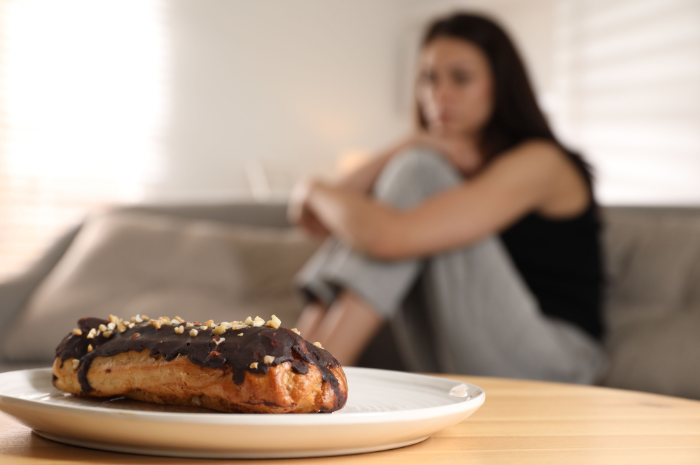Download your FREE ebook!
What is Anorexia Nervosa?

“As a young teen, I would read magazines and see pictures of models with skeletal bodies under medical warnings, but I didn’t understand why until I grew up and developed anorexia.” Sara
Anorexia Nervosa is one of the most serious types of eating disorders, characterized by significant weight loss, an intense fear of food, and an inability to perceive one’s own thinness (Body Dysmorphic Disorder).
As my client Sara has shared…
“No matter how much weight I lost, I never saw any change in my reflection, I always saw the image of an inadequate girl in the mirror.”
Diagnosis
According to the Diagnostic and Statistical Manual of Mental Disorders (DSM-V), the diagnosis of anorexia nervosa relies on three main criteria:
- Restriction of food intake relative to the body’s needs, resulting in a significant loss of body weight in the context of age, sex, and physical health.
- Intense fear of gaining weight or becoming obese, accompanied by persistent behaviors aimed at preventing weight gain.
- Disturbance in the perception of body weight or shape (such as body dysmorphia) or the impact of body weight/shape on self-esteem.
It is important to note that anorexia nervosa includes sub-types rather than being a singular disorder:
- Restrictive Type:
This is the most common sub-type of anorexia, where the individual maintains a low weight through food restriction and does not engage in binge-eating or purging behaviors. - Binge/Purging Type:
Individuals with this sub-type experience episodes of binge-eating followed by compensatory behaviors, such as vomiting, misuse of laxatives or diuretics, fasting, or excessive exercise. These are the most recognized behaviors associated with this type. - Atypical Type:
This sub-type presents all symptoms of anorexia nervosa except for low body weight, However, individuals must still be diagnosed and receive care regardless of their weight.
Common Symptoms of Anorexia Nervosa
Physical Symptoms:
- Severe weight loss or failure to gain expected weight during puberty.
- Anemia and hypotension (low blood pressure).
- Persistent thinness and dizziness.
- Hair loss and increased body hair growth.
- Amenorrhea (cessation of menstruation).
- Excessive exercise.
- Dehydration and yellowing of the skin.
- Cyanosis of the extremities (reduced blood flow to the limbs).
- Inability to tolerate cold temperatures.
- Constipation.
- Insomnia and sleep disturbances.
- Cardiac arrhythmias (heart rhythm problems).
- Edema (swelling) and delayed wound healing.
- Osteoporosis and recurrent fractures.
Psychological and Behavioral Symptoms:
- Increased risk of depression, anxiety, and obsessive-compulsive disorder.
- Heightened emotional reactivity, irritability, and impatience.
- Obsessive thoughts about food, calorie counting, and fat content (which may extend to monitoring others).
- Persistent feelings of guilt and self-reproach after eating.
- Difficulty concentrating and maintaining attention (in contrast to initial onset).
- Compulsive exercise or movement (with a fear of sitting still or stopping).
- Constant comparison with others regarding their bodies, food choices, and activity levels.
- Distorted body image and perceiving one’s body inaccurately.
- Social isolation and feelings of loneliness.
- A desire for control over various aspects of life (perfectionism).
- Fear or shame about revealing one’s body and wearing revealing clothing.
- Diminished sensory perception and feelings of detachment.
- Engaging in unusual eating behaviors (such as chewing food excessively, cutting it into very small pieces, or using specific utensils and dishes).
- Preparing meals for others and prioritizing their needs over one’s own.
- Compulsive spending or extreme frugality.
- Stealing or concealing food.
You don’t need an official diagnosis to seek treatment (especially if it’s not available). Instead, ask yourself: How many of the following symptoms apply to me?
Probable Causes
There is no single cause for developing anorexia. Researchers view the disorder as a result of a combination of genetic, social, cultural, and psychological factors.
While certain factors increase the likelihood of developing anorexia, those with the disorder typically have a genetic predisposition.
(50-80% of cases are due to genetic factors)
Some factors that also play a role include:
- Social factors: Societal beauty standards and the idealization of thinness have contributed to the rise in eating disorders. Comparison, bullying, and the preference for thin individuals have increased pressure on adolescents to maintain a certain weight and appearance.
- Psychological factors: Individuals with anorexia are often characterized by traits like perfectionism and obsessive-compulsive tendencies, displaying compulsive behaviors in this regard. Eating disorders frequently co-occur with other mental health conditions, such as depression or anxiety (53% of those with eating disorders are diagnosed with anxiety disorders).
Source: Center for Discovery Eating Disorder Treatment
Treatment Options for Anorexia
Anorexia nervosa is a complex condition that requires a multidisciplinary team for effective treatment. The first step is consulting a general practitioner who will refer the individual to a team of mental health and healthcare specialists, ideally including:
- Family therapy for individuals under 18
- Cognitive-behavioral therapy for eating disorders (CBT-E)
- Health counseling
- Individual and/or group coaching
- Psychoeducation
- Nutrition specialists
Recovery from anorexia nervosa is not easy and requires ongoing support. It is a long-term journey aimed at restoring physical health and psychological rehabilitation, and in severe cases, may require hospitalization.
As an eating disorder recovery coach, I believe that full recovery is 100% possible if you acknowledge the problem and commit to the recovery process. So far, I haven’t met anyone who regretted recovering from an eating disorder. On the contrary, they often view it as one of the most significant achievements in their lives.
In her book Eating in the Light of the Moon, Dr. Anita Johnston says:
“Recovering from an eating disorder requires the courage to face our fears and to restore our relationship with food as a means of celebrating life”
Frequently Asked Questions:
- Does anorexia only affect girls?
No, anorexia can affect anyone regardless of gender or age. It is more common among girls, but 25% of those affected are boys. - Is anorexia associated with other mental health issues?
Yes, like other eating disorders, anorexia is associated with mental health issues such as depression, anxiety, and obsessive-compulsive disorder. - Do I have to be extremely thin to have anorexia?
No, you don’t need to be underweight (below 18 on the BMI scale) to be diagnosed or receive treatment. This refers to the third type of anorexia nervosa. - What’s the difference between bulimia and the second type of anorexia?
In bulimia, a person experiences recurrent episodes of binge eating followed by compensatory behaviors to purge the food. They are often not underweight. Bulimia is associated with feelings of guilt, shame, and a desire to control weight.
In the second type of anorexia, binge episodes are infrequent and followed by compensatory behaviors, and the individual is usually underweight. Anorexia is linked to feelings of inadequacy, distorted self-image, and a desire for further weight loss.







Leave A Comment